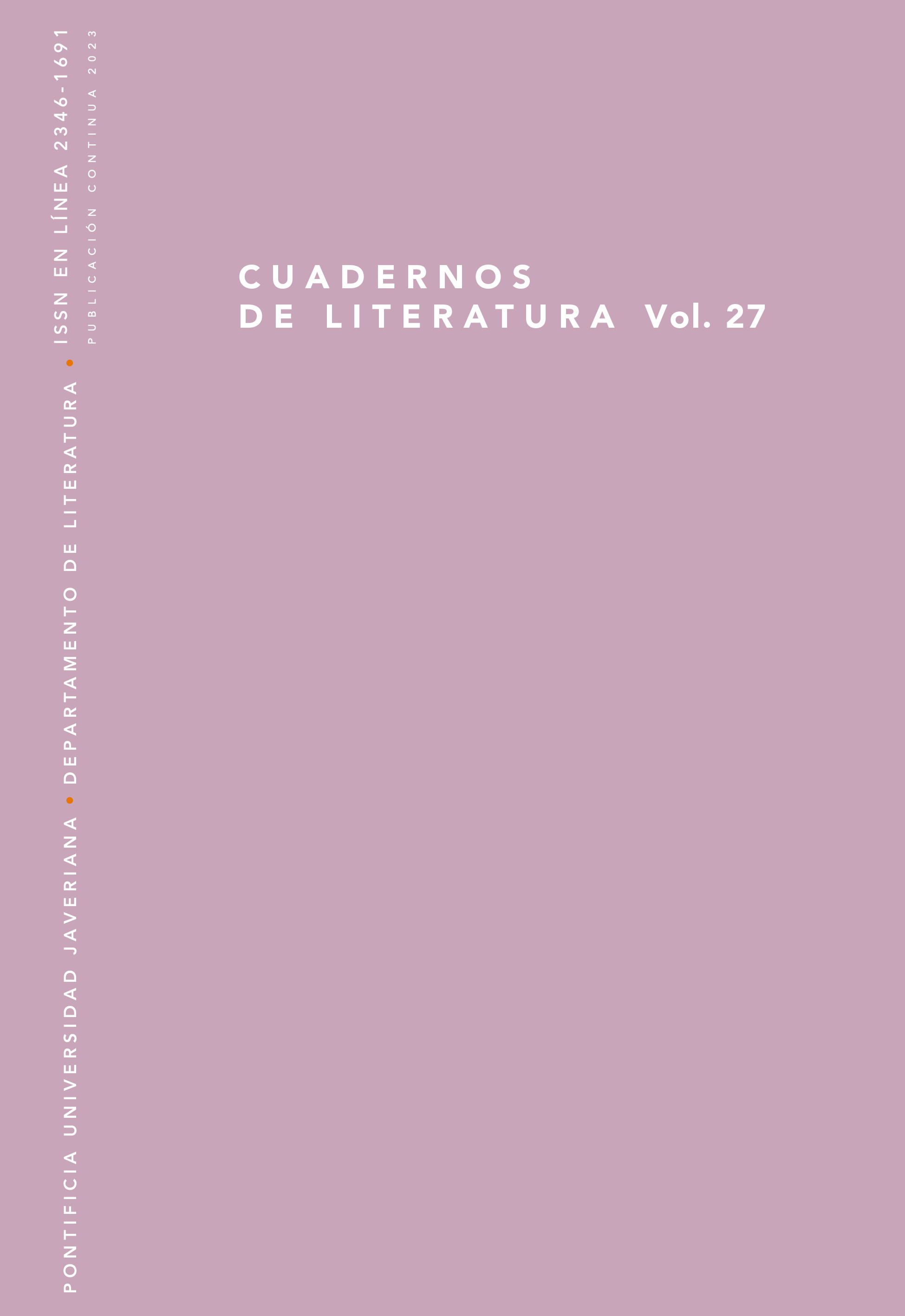Resumen
El presente artículo construye una “poética del sur global”, es decir, un ensamblaje crítico que es fruto de mi lectura personal y a través del cual analizo los recursos técnicos y las sensibilidades afectivas que componen la materialidad de la lengua estética del poema Canto a su amor desaparecido (1985), escrito por el artista visual y poeta chileno Raúl Zurita. Todo ello con el fin de examinar cómo la cartografía de un territorio pesadillesco (la necrópolis del sur) reconfigura las concepciones del cuerpo desaparecido, el testimonio, los soportes estéticos y, especialmente, las representaciones del “sur” en la poesía latinoamericana del siglo XX.
Alighieri, Dante. Divina comedia. Tr. Francisco Montes de Oca. Editorial Porrúa, 2015 [1321].
Beverley, John. “Anatomía del testimonio”. Centro de Estudios Literarios Latinoamericanos (Antonio Cornejo Polar), núm. 25, 1987, pp. 7-16.
Breton, André. Manifiestos del surrealismo. Tr. Aldo Pellegrini. Editorial Argonauta, 2001.
Casas, Bartolomé de las. Brevísima relación de la destrucción de las indias. Editorial Universidad de Antioquia, 2011.
Celan, Paul. Obras completas. Tr, José Luis Reina Palazón. Editorial Trotta, 2020 [1963].
Cruz, Juan de la. Poesías completas. Editorial La Oveja Negra, 1983.
Dussel, Enrique. “Europa, modernidad y eurocentrismo”. La colonialidad del saber: eurocentrismo y ciencias sociales. Perspectivas latinoamericanas. Comp. Edgardo Lander. Consejo Latinoamericano de Ciencias Sociales, 2000. pp. 24-33. http://biblioteca.clacso.edu.ar/clacso/sur-sur/20100708034410/lander.pdf
Eltit, Diamela. El padre mío. Francisco Zegers Editor, 1989.
García Márquez, Gabriel. Chile, el golpe y los gringos. Editorial Latina, 1974.
Giorgi, Gabriel. Formas Comunes: animalidad, cultura, biopolítica. Eterna Cadencia, 2014.
“Mensaje del poeta Raúl Zurita al 15 Festival Internacional de Poesía de Quetzaltenango”. YouTube, subido por FIPQ Metáfora Quetzaltenango, 20 de agosto de 2019. https://www.youtube.com/watch?v=YLIH_1LlQzs
Mignolo, Walter. El lado más oscuro del renacimiento. Tr. Cristóbal Gnecco. Editorial Universidad del Cauca, 2016.
Neruda, Pablo. Antología general. Alfaguara, 2010.
Padilla, Elías. La memoria y el olvido. Ediciones Orígenes, 1995.
Quevedo, María Piedad. “Monstruosidad y colonialismo”. Maestría en Literatura, sesión 5, 3 de marzo de 2021, Pontificia Universidad Javeriana.
Ramos, Julio. “Descarga acústica”. Revista Iberoamericana, núm. 251, 2015, pp. 49-77.
Richard, Nelly. Fracturas de la memoria. Arte y pensamiento crítico. Editorial Siglo XXI, 2007.
Rimbaud, Arthur. Obra completa bilingüe. Tr. Mauro Armiño. Atalanta, 2016.
Rodríguez Marcos, Javier. “La voz de Raúl Zurita se desangra en verso y prosa”. El País, 3 de junio de 2016. https://elpais.com/cultura/2016/06/01/actualidad/14
Rosaldo, Renato. Cultura y verdad. La reconstrucción del análisis social. Tr. Jorge Gómez. Ediciones Abya-Yala, 2000.
Salcedo, Doris. “Nombrar lo innombrable: conversaciones sobre arte y verdad”. YouTube, subido por Comisión de la Verdad, 25 de junio de 2020, https://www.youtube.com/watch?v=_zTJBUbJEWs.
Soca, Ricardo. El origen de las palabras. Diccionario etimológico ilustrado. Rey Naranjo Editores, 2016.
Sousa Santos, Boaventura de. De la mano de Alicia: lo social y lo político en la postmodernidad. Tr. Consuelo Bernal y Mauricio García Villegas. Siglo del Hombre Editores y Ediciones Uniandes, 2006.
Taylor, Diana. “Performance, teoría y práctica”. Estudios avanzados de performance. Fondo de Cultura Económica, 2011.
Teresa de Jesús, Santa. Obras completas (Tomo II). La Editorial Católica, 1954.
“The Clinic: Zurita rockeando poesía”. YouTube, subido por The Clinic, 17 de agosto de 2018. https://www.youtube.com/watch?v=3NUROb6la5Y
Vallejo, César. El Tungsteno - Paco Yunque. Plaza & Janes Editores, 1984.
“Verás un mar de piedras. En torno a Raúl Zurita”. Museo Nacional Centro de Arte Reina Sofía, 3 de mayo de 2012. https://www.museoreinasofia.es/actividades/veras-mar-piedras-torno-raul-zurita
Visscher, Nicolaes. Nova Totius Terrarum Orbis Geographica ac Hydrographica Tabula. 1639. Material Cartográfico. Portal de datos bibliográficos de la Biblioteca Nacional de España. https://datos.bne.es/edicion/a4561695.html
Zurita, Raúl. Anteparaíso. Almadía Ediciones, 2016.
Zurita, Raúl. Canto a su amor desaparecido. Editorial Universitaria, 1985.
Zurita, Raúl. “Canto de los ríos que se aman”. La vida nueva. Editorial Universitaria, 2010. Zurita, Raúl. “Discurso”. Verás. Ediciones Biblioteca Nacional, 2017.
Zurita, Raúl. INRI. Fondo de Cultura Económica, 2003.
Zurita, Raúl. La vida nueva. Lumen, 2018.
Zurita, Raúl. Literatura, lenguaje y sociedad (1973-1983). CENECA, 1983.
Zurita, Raúl. Purgatorio. Ediciones Universidad Diego Portales, 2013 [1979].
Zurita, Raúl. Un mar de piedras. Fondo de Cultura Económica, 2018.

Esta obra está bajo una licencia internacional Creative Commons Atribución 4.0.



